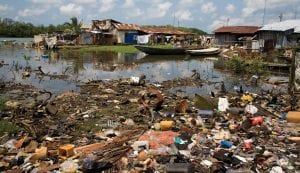Research Update: Localising Emergency Management in Nigeria
By Rebekah Yore, on 7 November 2017
Article by Emmanuel Agbo
The recent devastating effects of natural hazards globally, such as hurricanes, floods, earthquakes, erosion, tsunamis, and landslides, in spite of the many predictive, defensive and reduction measures, call for great concern. Though this situation is often largely attributable to climate change, population growth and urbanisation, its catastrophic effect to humans and the environment, shows to a greater extend the limitations of science and technology and the many disasters risk reduction measures in disaster management. It also highlights a potential need for more proactive measures towards disaster risk reduction.
 Nonetheless, government commitment and willingness to undertake disaster risk reduction measures proves to be a veritable tool for effectiveness in disaster management. While the viability of this tool is undoubtably clear, its implementation often becomes distorted in most developing nations. This is so, as the shared responsibility between the state, the federal and the local government, in a top-down disaster operational approach as practice by most developed economies and adopted by many developing nations, suffers lots of implementation flaws. This occurs frequently within federated nations, where each government level is viewed as a sovereign state. This approach of emergency management places the civil protection measures at the mercy of politicians, who often prefer the provision of relief material to disaster victims in a bid to secure cheap political points rather than engaging in activities that will better prepare the vulnerable towards disaster incidents.
Nonetheless, government commitment and willingness to undertake disaster risk reduction measures proves to be a veritable tool for effectiveness in disaster management. While the viability of this tool is undoubtably clear, its implementation often becomes distorted in most developing nations. This is so, as the shared responsibility between the state, the federal and the local government, in a top-down disaster operational approach as practice by most developed economies and adopted by many developing nations, suffers lots of implementation flaws. This occurs frequently within federated nations, where each government level is viewed as a sovereign state. This approach of emergency management places the civil protection measures at the mercy of politicians, who often prefer the provision of relief material to disaster victims in a bid to secure cheap political points rather than engaging in activities that will better prepare the vulnerable towards disaster incidents.
In recognition of these challenges, and in the quest to better prepare for disasters, my research supposes that locally institutionalising an emergency management culture within developing nations, serves to quell inconsistencies in its emergency operational framework. As all disasters, regardless of scale, happen first in communities, the local people are always the first to address its occurrences. To achieve greater preparedness, the level of information and awareness of hazards, as well as the potential mitigation strategies at the local level, needs be enhanced. To this end my research, through the Institute for Risk and Disaster Reduction research fund assistance, recently involved undertaking a field assessment of community perceptions of flood hazards, preparedness, and response within a number of flood vulnerable communities in Nigeria. Its preliminary findings point to poor preparedness and weak knowledge of flood emergency response, weak mitigation measures and poor defense mechanism. Also of notable finding is the gap in communication between the civil protection agencies and the rural vulnerable communities during and after disaster incidents. While most of these factors exist, and continually require review in most developing nations, there is a need for demonstrating complete structures to improve on these challenges. This is the focus of my research.
 Close
Close


